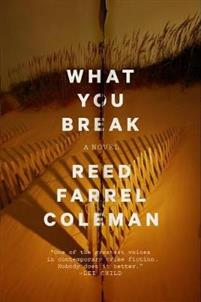Colorblind by Reed Farrel Coleman
 Friday, September 14, 2018 at 9:29AM
Friday, September 14, 2018 at 9:29AM Published by G.P. Putnam's Sons on September 11, 2018
The Robert B. Parker factory produced Colorblind (excuse me, Robert B. Parker’s Colorblind). The seventeenth Jesse Stone novel was assembled by Reed Farrel Coleman, who took over the factory job from Michael Brandman. Parker managed to write nine Jesse Stone books before he died and the factory took over. There’s nothing necessarily wrong with factory novels (I like the Spenser novels that Ace Atkins writes), but wouldn’t it be nice to see Coleman’s name in a font that is as large as Parker’s?
The victim of the first murder in Paradise after Stone became Chief of Police was a woman. The word “slut” was written on her body. Now, in a town near Paradise, another murder has followed that pattern, except that the victim is black. Early chapters that focus on a white supremacist neo-Nazi create the impression that the latest murder, at least, is racially motivated.
An outbreak of attacks on interracial couples also has Stone worried about trouble in Paradise, as well as flyers from the “Saviors of Society” that bash liberals, gays, nonwhites, feminists, atheists, and people who want to regulate guns. A character called the Colonel, the leader of the Saviors, tries to make America great again by causing trouble for Stone and his African-American officer, Alisha Davis, who is accused of shooting an unarmed suspect. The resolution of the Davis plot line is beyond implausible.
I appreciate the sentiment underlying the novel’s depiction of right-wing lunatics, but Coleman is so heavy-handed in that portrayal that it didn’t quite ring true. As villains go, the Colonel is completely over the top.
Jesse’s battle with alcoholism and his reliance on AA to resist using alcohol as a stress reliever is a fairly common device to add interest to characters in cop novels. Unfortunately, Jesse’s rather ordinary demons are not enough to make him compelling. Jesse was edgy in his original conception; now he's just dull. The frequent references to his ability to stay strong and avoid the bottle come across as a substitute for deeper character development, as is the portrayal of Jesse as a stalwart, incorruptible, by-the-book cop (unless he’s beating someone up because he decides they deserve it).
There’s a difference between being admirable and interesting, and Jesse is too boring to be interesting. The attempt to humanize him by changing his personal life at the novel’s end feels forced. The supporting characters are more like shadows than people; Coleman makes no serious effort to give them depth.
The story moves quickly, thanks to Coleman’s dialog-heavy writing style. The plot lacks surprises and the heroic ending is a bit silly. I have no strong feelings, positive or negative, about Colorblind. I’m recommending it primarily to fans of the series, but there are so many thrillers that are better than this one, I can’t recommend it to readers who are looking for something special, or even something that’s above average.
RECOMMENDED WITH RESERVATIONS
